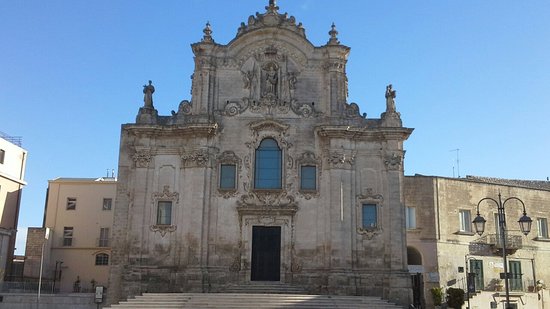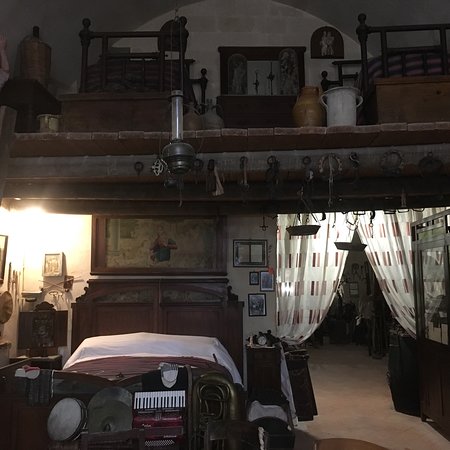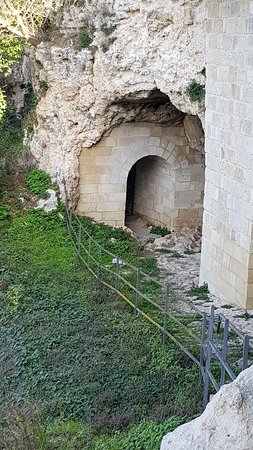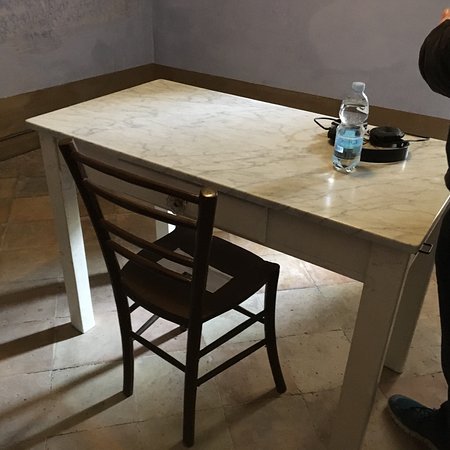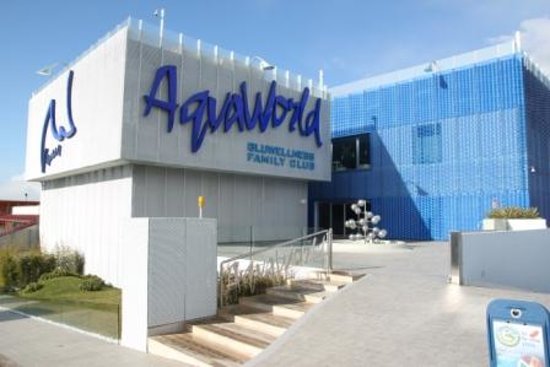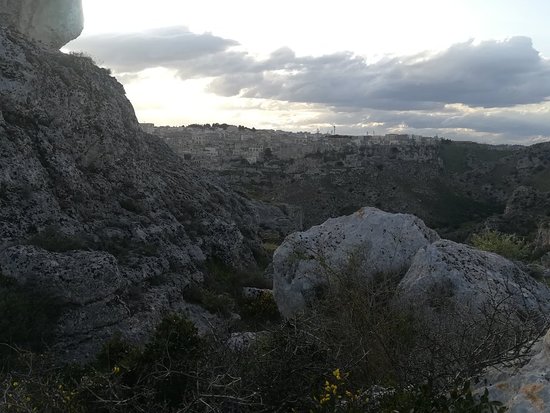The 10 Best Things to Do in Matera, Italy
Get to Matera quickly, because it’s still relatively undiscovered by foreign tourists. In town, visit the Domenico Ridola National Museum. Matera’s real claim to fame, though, and the reason it’s a UNESCO World Heritage Site, is the extensive series of cave dwellings ("i sassi") southeast of town, first inhabited by Benedictine and Basilian monks. You’ll see individual cells, chapels, and even some churches, many adorned with Byzantine decorations and frescoes.
Restaurants in Matera
1. Sassi di Matera
Overall Ratings
5 based on 11 reviews
Reviewed By Vladimir1998 - Rotterdam, The Netherlands
The Sassi di Matera are something everyone should see at least once in their life. Considered one of the oldest continuously inhabited places in the world, Matera is a completely fascinating town. We saw it on a day trip, but it's great if you can spend 2 or 3 days here and explore the whole area and all the crypts and caves.
There are 2 districts worth seeing: Sasso Caveoso and Sasso Barissano - I personally liked the first one more, but really both are great. You can get quite a cheap 6 euro ticket to see 3 of the cave churches (Madonna de Idris e S. Giovanni in Monterrone, Santa Lucia alle Malve, San Pietro Barisano), which I really recommend. It can be bought at any of these churches.
The whole town is like a labyrinth, so you might get lost a few times and Google Maps couldn't help too much (unless you want to walk on the car roads, which is dull). But that's part of the charm and I'd say it's completely worth it.
2. Museo Laboratorio della Civilta Contadina
Overall Ratings
5 based on 193 reviews
A restored XVI century building with court located in via San Giovanni Vecchio 60 (Sasso Barisano) is the home of the 500 m2 large Museo Laboratorio della Civiltà Contadina (Museum-Workshop of the Peasant Culture). The exhibition rooms are dedicated to the ancient trades related to the work in the fields but also to all the other handicraft activities carried on in the ancient quarters of Matera: sieve-maker, tanner, shepherd, basket-maker, cavamonti, shoe-shiner, barber, cabinet-maker, mastro d'ascia, blacksmith, tailor, conciapiatti, potter, knife-grinder, saddler, coppersmith, cobbler, peasant, scalpellino. Also, various every-day tools are exposed: farm tools, equipment for storage and processing of wheat, weaving equipment. Other rooms are dedicated to daily-life places - such as the public wine cellar and the typical house - and themes related to the South-Italy history such as brigandage, childhood condition and water-harvesting. The Museo-Laboratorio aims to be a dynamic structure among the tourism products of Matera and a reference for the development of the culture of the past through exhibition and educational activities.
Reviewed By Rob M - London
This is an outstanding collection of artefacts from peasant culture and the "makers" of the past. This venue takes time to fully appreciate, and I thoroughly recommend the curators book - which is a collection of "peasant" memories, experiences and examples of everyday living. This museum is an ethnographic gem, and should feature on any itinerary - something here for all ages and interests.
3. Materasum Ipogeo
Overall Ratings
5 based on 167 reviews
Matera Sum ipogeo is a place where space and time stop to tell you the history. traditions and culture mix of one of the most ancient cities in the world. pure emotion from the depths of the earth
Reviewed By supergirlUk - UK
Great visit with very helpful audio guide in Italian but written explanations in English, French and Japanese. Great historical visit explaining the way life used to be in Matera
4. Parco della Murgia Materana
Overall Ratings
4.5 based on 590 reviews
Reviewed By jerseyjazz - New Jersey
Photographers' paradise! Extraordinary park, both for the views across to the city and for the walks. You can hike back by descending into the gorge, but don't plan to do this unless you are well-equipped with good hiking shoes, water, snacks, and protection from the hot sun. There is not much signage to guide you. We were driven to the park, expecting to hike back. We decided against it and called for a cab ride back. (Bring the number of a few cab companies with you.) It cost 25 Euros for the four of us and was well worth it.
5. Cripta del Peccato Originale
Overall Ratings
4.5 based on 782 reviews
The Crypt of the Original Sin, in Matera, is located inside a natural cave on the Murgia plateau, near the old Appian Way. Commonly known as “the Sistine Chapel of rupestrian art”, the Crypt was discovered in 1963 by a group of local youths, who noticed the splendid frescoes in what at the time, had become a shelter for sheep herds.Experts later dated the cycle of paintings back to the second half of the 8th century, with Late-Romanesque style and formal elements of Oriental inspiration, such as the Byzantine-style Triarchsand the profile of the Virgin Mary, majestically represented in the sumptuous clothes of the Byzantine empress, the Basilissa.The anonymous, humble artist – who was soon nicknamed the “Flower Painter” – depicted biblical figures in total freedom: God the Creator, Light and Darkness, Adam and Eve, the three Apostles John, Peter and Andrew, the Archangels and Mary. The paintings on the rough walls of the cave are different and unique in Matera’s iconographic context. The scenes are the fruit of the painter’s personal creativity and certainly speak of his freedom in translating complex depictions, and of a lively spontaneity in drawing images. The Crypt of Original Sin may only be visited by booking.
Reviewed By Christopher T - Eustis, Florida
Visiting the Crypt of Original Sin was profoundly touching and humbling. The frescoes are beautiful and truly unlike any others.
Unlike some other unprotected caves and frescoes, this experience is controlled to protect the site. You need to buy your tickets ahead of time on the website and you won't have time in the cave by yourself to simply contemplate. The interpretive audio was well done and informative.
It was easy to find. If you select the correct exit from SS7, you pretty much can't miss it. I'm not sure why people have mentioned the difficulty in finding it. GPS will take you directly there as well.
The website is really quite thorough and accurate on all of this. Buy your tickets ahead of time and follow the directions. You will be glad you did!
6. Casa Noha
Overall Ratings
4.5 based on 1 reviews
Immersa nei Sassi, una casa diventa luogo della conoscenza e della memoria di una storia millenaria, quella della città di Matera, scritta su una roccia friabile e porosa come il tufo.
Reviewed By Titus D - Sri Lanka
What a gem! This brilliant museum tells the tragic tale of the city of Matera and the Sassi (caves) through the centuries. The museum is part of the happy ending of that story and is a tribute to humanity's potential for generosity and altruism.
Mainly consists of a series of short films in different rooms that illustrate and explain the story of Matera. One of the best presented museums I have seen in 35 years as a professional tourist guide ( in England, not Italy). The movie shown perfectly explains the history and culture, as well as the ups and downs of the local economy and living standards of the poor
Get the audio guide if you don't understand Italian.
To really understand the history of the Sassi, I think everyone should go to Casa Noha for a visit, to see both the sad and happy events that shaped this amazing city.
This is probably the first thing you should do in Matera if you are exploring the Sassi. It provides a background on their origination.
As others have advised, we made this our first stop in Matera which gave us more appreciation for the place. It is fascinating, and tragic history. Very good value I think, and the film program is available in English through headphones, a pleasant audiovisual experience. Between waiting time before the program started and the length of the film, our visit was prolonged for an hour.
By viewing this film, you understand exactly what Matera is all about! You move through 2 rooms to view the films that are shown on the white stone walls and learn the history of this magnificent place. This was excellent and provided a great insight into the Sassi. One of the highlights of the trip as the details provided brought the Sassi to life. It was in English. For all the rest, make it what you do first. The city makes more sense after you have been here. If all you want to do when you visit a new place is shop, maybe miss it.
7. Aqvaworld Bluwellness Family Club
Overall Ratings
4.5 based on 270 reviews
Aqvaworld is an exclusive multifunctional Club located in Matera focused on Wellness. The Club has six pools heated up to 32° C and has been designed on the purpose of using only one element: water. A vertical structure built on five levels, each one has different areas: Swim, Fitness, Medical Wellness, Scuba Diving, Beauty Farm, Solarium with an open-air swimming pool, Entertainment, Travel, Shops and Services. Aqvaworld is perfect for families all day long and for relax week end.
Reviewed By bepperok87
Io e la mia fidandata abbiamo trascorso un pomeriggio di puro relax presso questa struttura; percorso spa compreso di bagno turco, sauna, doccia emozionale, idromassaggio e massaggio completo di faccia, cervicale e schiena. Il personale si é rivelato cortese é disponibile, la struttura é grande e pulita, buona anche la tisana che ci hanno servito. Lo consiglio
8. Parco delle Chiese Rupestri di Matera
Overall Ratings
4.5 based on 345 reviews
According to the World Heritage site, "Matera's Sassi are the best surviving and most complete examples of rock-cut settlement in the Mediterranean region. They have been developed in close harmony with the natural environments."
Reviewed By Magellano81 - Tortona, Italy
The famous rock-hewn churches of Matera are one of the many attractions that you can visit in the area of the "Sassi". Obviously and unfortunately you have to buy a ticket to visit them every time you want to visit one, or directly at the tourism office could buy the pass that will allow you to visit them all, saving money. I do not know if it's worth visiting them all, but I admit that these are very difficult stage and you'll get to see anywhere else.
9. San Giovanni Battista
Overall Ratings
4.5 based on 337 reviews
Reviewed By KrisD_pl - Warsaw, Poland
Built in 13th century, a church dedicated to St. John. Beatiful from the outside, however it came to us as a surprise that the current main facade few centuries earlier was the side facade - the original main one was incorporated into the now neighbouring Ospedale building. When inside, the church is not so striking. It's worth a quick look during a stroll through the streets of old Matera.
10. Chiese rupestri Madonna delle Virtu e San Nicola dei Greci
Overall Ratings
4.5 based on 172 reviews
Complesso rupestre che comprende due fra le più importanti chiese rupestri presenti negli antichi rioni Sassi di Matera. Comprende anche il monastero un tempo annesso a Madonna delle Virtù ed un vicinato con una serie di case grotta e cantine. Luogo ad uso museale, nei mesi estivi ospita "Le Grandi Mostre nei Sassi" di scultura, evento organizzato dal Circolo Culturale "La Scaletta" e gestito dal team della Società "Cave Heritage - Arte, Cultura e Turismo".
Reviewed By Joanne P - Bowral, Australia
Caves include churches and dwellings and when we visited included an amazing and extensive modern sculpture exhibition. Quite extraordinary and worth the €8 entry. You don't really need a guide, there is an audio available however we simply enjoyed walking around and taking our time. The frescos are impressive as well as ancient wine presses and evidence of how the monks and the people may have lived. We stayed for around 1.5 hours - don't rush, sit outside and enjoy sculpture and views as well.

